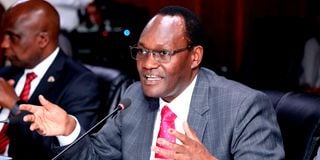Premium
Losers in Kemsa deal win Global Fund nets contract

National Treasury Principal Secretary Chris Kiptoo.
The Global Fund awarded the contract for procurement of Sh3.7 billion mosquito nets to two firms that failed in the bid that was floated by the Kenya Medical Supplies Authority (Kemsa), MPs heard on Wednesday, July 12.
The two firms were among the 17 companies that were unsuccessful bidders at Kemsa but were awarded the tender to supply the polyethene and polyester nets under the Global Fund Pooled Mechanism website (Wambo.org).
Treasury Principal Secretary Chris Kiptoo told the Senate committee on Health that the Global Fund has since awarded two manufacturers — A to Z Textiles Mills Ltd and Tianjin Yorkool International Trading Co. Ltd — to supply the anti-mosquito nets.
“These are among Global Fund prequalified suppliers. These two manufacturers are part of the initial 17 bidders in the tender no. GF ATM MAL NFM 2022/2023 OIT-02 for the supply of long lasting insecticide nets (LLINS),” Dr Kiptoo said.
The Global Fund had floated the multi-billion shilling tender for the provision of 10.2 million nets to be distributed from November this year to July next year as part of the fight against malaria.
Global Fund cancelled the tender that Kemsa was to award for the supply of mosquito nets, citing procurement irregularities.
The fund nullified the tender on grounds that they failed to meet the mandatory documentation requirement and offered it directly to its own procurement wing, Wambo.org.
Dr Kiptoo said Global Fund has a right to conduct its own procurement processes if it is dissatisfied with the tendering undertaken by Kemsa.
“The Global Fund did the procurement because it felt that the evaluation criteria used by Kemsa was not fair to all bidders,” he said. “The Fund has a right to carry out its own procurement if it does not trust our procurement processes.”
Dr Kiptoo revealed that several other donor agencies, including the Usaid and UK Aid, have opted to procure themselves for projects they finance in the country.
“There is no money to the government directly from Usaid and UK Aid. They give us money and do the procurement. If the Global Fund finds that it can’t trust our procurement system in the case of Kemsa, then they have a right.”
Dr Kiptoo appeared before the committee chaired by Uasin Gishu Senator Jackson Mandago which is probing the failed mosquito nets tender.
He said Kenya has benefited from Global Fund funding since inception in 2002, with the country having signed grants worth $2 billion, committed $1.69 billion and disbursed $1.67 billion so far.
Dr Kiptoo said the National Treasury administers all grants from the Global Fund and not the Ministry of Health, which is the user department or Kemsa, which is the procuring agent.
“All communication from the Ministry of Health to Kemsa must pass through the Treasury and then we relay it to Kemsa,” Dr Kiptoo said. “It was wrong for the PS, Ms Mburu, to write directly to Kemsa on the issue of specifications of the mosquito nets in the advertised tender.”
Then Public Health PS Josephine Mburu had on February 22, 2023 written to then Kemsa CEO Terry Ramadhani drawing attention to inconsistencies in the technical specifications of the bed nets to be procured, leading to extension of the tender closing dates by two weeks from February 23, 2023.
Dr Kiptoo said the letter to Kemsa questioning the technical specifications should have been forwarded to the Global Fund team at the Treasury for review and onward transmission to Kemsa.
The PS said the Treasury is implementing e-procurement for common user items starting with 10 institutions from this month.
“We intend to move the entire government to e-procurement to remove human interference with tendering by July 2024,” he said.




